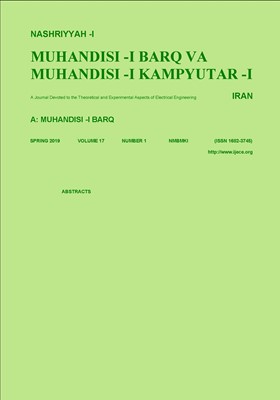تعیین استراتژی بهینه برنامهریزی نگهداشت پیشگیرانه در حضور منابع پاسخگوی بار
الموضوعات : electrical and computer engineeringوحید شریفی 1 , مسعود رشیدینژاد 2 , امیر عبداللهی 3 , مژگان ملاحسنیپور 4
1 - دانشگاه شهید باهنر کرمان
2 - دانشگاه شهید باهنر کرمان
3 - دانشگاه شهید باهنر کرمان
4 - دانشگاه سیستان و بلوچستان
الکلمات المفتاحية: برنامهریزی نگهداشت تولیدیتئوری بازیهای غیر مشارکتیتعادل نشپاسخگویی بار,
ملخص المقالة :
در این مقاله روشی نوین بهمنظور برنامهریزی نگهداشت واحدهای تولیدی در محیط رقابتی بازار برق ارائه شده است. مسئله برنامهریزی نگهداشت تولیدی به علت تأثیرگذاری بر روی امنیت و انتشار آلایندگی سیستم و سود تولیدکنندگان یکی از مهمترین موضوعات در محیط تجدید ساختاریافته سیستم قدرت میباشد. بهمنظور در نظرگیری ریسک تولیدکنندگان، برنامهریزی نگهداشت تولیدی از دیدگاه تولیدکنندگان با استفاده از تئوری بازیهای غیر مشارکتی مدل گردیده که بهمنظور دستیابی به استراتژی بهینه از تعادل نش بهره برده شده است. از سوی دیگر، بهرهبردار مستقل سیستم به دنبال دستیابی به سطح قابلیت اطمینان مناسب و کاهش آلایندگی است. در این بین برنامههای پاسخگوی بار یکی از گزینههای اثرگذار بر سیاستهای حوزه تصمیمگیری انرژی میباشند. در این مقاله از منابع پاسخگوی بار بهعنوان منبعی مجازی برای تدارک رزرو سیستم بهره برده شده است. همچنین بهمنظور همسوساختن برنامه نگهداشت تولیدکنندگان با برنامه نگهداشت قابلیت اطمینان– آلایندگی محور از فرایند هماهنگسازی بهره برده شده است. مدل پیشنهادی بر روی شبکه استاندارد 24 باس اصلاحشده IEEE-RTS پیادهسازی شده و نتایج حاصل، نشاندهنده کارامدی روش پیشنهادی است.
[1] FERC, Staff Report, Assessment of Demand Response and Advanced Metering, [Online]. Available: http://www.FERC.gov; Aug. 2006, [Accessed 14.08.12].
[2] A. Abdollahi, M. P. Moghaddam, M. Rashidinejad, and M. K. Sheikh-El-Eslami, "Investigation of economic and environmental-driven demand response measures incorporating UC," IEEE Trans. on Smart Grid, vol. 3, no. 1, pp. 12-25, Mar. 2012.
[3] E. Lakic, G. Artac, and A. F. Gubina, "Agent-based modeling of the demand-side system reserve provision," Electric Power Systems Research, vol. 124, pp. 85-91, Jul. 2015.
[4] M. Parsa Moghaddam, A. Abdollahi, and M. Rashidinejad, "Flexible demand response programs modeling in competitive electricity markets," Applied Energy, vol. 88, no. 9, pp. 3257-3269, Sept. 2011.
[5] L. Wu, M. Shahidehpour, and T. Li, "GENCO's risk-based maintenance outage scheduling," IEEE Trans. on Power Systems, vol. 23, no. 1, pp. 127-136, Feb. 2008.
. [6] PJM Interconnection. Pre-scheduling Operations. Available: http://www.pjm.com/w/media/documents/manuals/m10.ashx; 2010, [Accessed14.08.12].
[7] California Independent System Operator. Outage Coordination Protocol. Available: http://www.caiso.com/docs/2002/03/20/200203201008509285.pdf; 2002, [Accessed 14.08.12].
[8] New York Independent System Operator. Outage Schedule Manual. Available: http://www.nyiso.com/public/webdocs/documents/manuals/opertons/outage_sched_mnl.pdf; 2011 [Accessed 14.08.12].
[9] The North American Electric Reliability Corporation. Operating Manual. Available http://www.nerc.com/files/opman_3_2012.pdf> 2012[accessed 14.08.12].
[10] A. Bozorgi, M. M. Pedram, and G. R. Yousefi, "Unit maintenance scheduling: a robust model, based on fuzzy cost factors and peak loads," Int J. Electr Power Energy Syst, vol. 79, pp. 142-149, Jul. 2016.
[11] M. Mollahassani-pour, M. Rashidinejad, A. Abdollahi, M. A. Forghani, "Demand response resources' allocation in security-constrained preventive maintenance scheduling via MODM method," IEEE Syst J., vol. 11, no. 2, pp. 1196-1207, Jun. 2017.
[12] M. Mollahassani-pour, M. Rashidinejad, and A. Abdollahi, "Appraisal of eco-friendly preventive maintenance scheduling strategy impacts on GHG emissions mitigation in smart grids," J. Clean Prod, vol. 143, pp. 212-223, 1 Feb. 2017.
[13] P. Mazidi, Y. Tohidi, A. Ramos, and M. A. Sanz-Bobi, "Profit-maximization generation maintenance scheduling through bi-level programming," Eur J. Oper Res, vol. 264, no. 3, pp. 1045-1057, 1 Feb. 2018.
[14] M. Mahvi and M. Ardehali, "Optimal bidding strategy in a competitive electricity market based on agent-based approach and numerical sensitivity analysis," Energy, vol. 36, no. 11, pp. 6367-6374, Nov. 2011.
[15] J. Wang, Z. Zhou, and A. Botterud, "An evolutionary game approach to analyzing bidding strategies in electricity markets with elastic demand," Energy, vol. 36, no. 5, pp. 3459-3467, May 2011.
[16] A. M. Foley, B. P. O. Gallachoir, J. Hur, R. Baldick, and E. J. McKeogh, "A strategic review of electricity systems models," Energy, vol. 35, no. 12, pp. 4522-4530, Dec. 2010.
[17] K. Sarica, G. Kumbaroglu, and I. Or, "Modeling and analysis of a decentralized electricity market: an integrated simulation/optimization approach," Energy, vol. 44, no. 1, pp. 830-852, Aug. 2012.
[18] J. H. Kim, J. B. Park, J. K. Park, and Y. H. Chun, "Generating unit maintenance scheduling under competitive market environments," International J. of Electrical Power & Energy Systems, vol. 27, no. 3, pp. 189-194, Mar. 2005.
[19] D. Jia, H. Cheng, W. Zhang, Z. Hu, J. Yan, and M. Chen, "A new game theory-based solution methodology for generation maintenance strategy," European Trans. on Electrical Power, vol. 19, no. 2, pp. 225-239, Mar. 2009.
[20] C. G. Min, M. K. Kim, J. K. Park, and Y. T. Yoon, "Game-theory-based generation maintenance scheduling in electricity markets," Energy, vol. 55, pp. 310-318, 15 Jun. 2013.
[21] A. J. Conejo, R. Garcia-Bertrand, and M. Diaz-Salazar, "Generation maintenance scheduling in restructured power systems," IEEE Trans. on Power Systems, vol. 20, no. 2, pp. 984-992, May 2005.
[22] P. K. Dutta, Strategies and Games: Theory and Practice, the MIT Press, 1999.
[23] M. Parvania and M. Fotuhi-Firuzabad, "Demand response scheduling by stochastic SCUC," IEEE Trans. on Smart Grid, vol. 1, no. 1, pp. 89-98, Jun. 2010.
[24] S. J. Wang, S. M. Shahidehpour, D. S. Kirschen, S. Mokhtari, and G. D. Irisarri, "Short-term generation scheduling with transmission and environmental constraints using an augmented Lagrangian relaxation," IEEE Trans. on Power Systems, vol. 10, no. 3, pp. 1294-1301, Aug. 1995.


